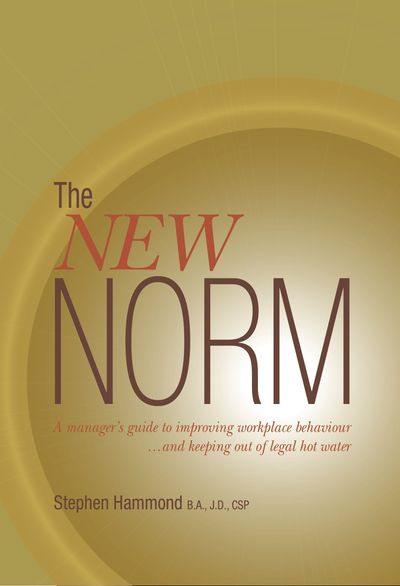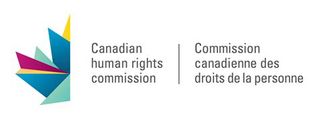Chapter fifteen
THE NEW NORM helps employees work with difficult family responsibilities
Fiona Johnstone worked full time for the Canada Border Services Agency. Her husband also worked for the CBSA as a supervisor. Both worked rotating four-hour shifts which started at six different times during the day with no predictable patterns. The schedule was based on a fifty-six-day pattern and employees were given fifteen days’ notice of each new shift schedule, subject to the employer’s discretion to change the schedule on five days’ notice.
Upon returning to work at Pearson Airport after maternity leave for their second child,. Johnstone asked for an accommodation to address their childcare needs. The CBSA said she could work a fixed schedule; however it would be part time with fewer benefits. Johnstone filed a human rights complaint, claiming discrimination based on family status.
On April 24, 2004, this case started with a complaint to the Federal Human Rights Commission, then the Federal Human Rights Tribunal, the Federal Court and ended at the Federal Court of Appeal with its decision on May 2, 2014 – ten years later. Other than the Supreme Court of Canada, this is the highest court under federal jurisdiction.
The federal government (the employer) argued for a very narrow meaning of “family status,” saying the courts should go no further than the “ordinary and grammatical” meaning of family status. The court noted that the CBSA was saying, when the government included family status, “Parliament did not intend to protect childcare responsibilities.”
However, all three judges took a different approach, noting their court wasn’t the first. They listed Canadian tribunals, arbitrators, the Federal Court of Canada and the British Columbia Court of Appeal after stating, “In fact, judges and adjudicators have been almost unanimous in finding that family status incorporates parental obligations such as childcare obligations.”
The court spoke about the importance of human rights legislation and how the Supreme Court of Canada has referred to human rights legislation as “quasi-constitutional,” meaning it’s not part of Canada’s constitution, but it’s pretty close and is given a lot of importance. “It is generally accepted that human rights legislation must be given a broad interpretation to ensure that the stated objects and purposes of such legislation are fulfilled.”
CBSA management could have benefited from taking my Respectful Workplace online course, where we go right into issues of discrimination based on family status and the need to make reasonable accommodations.
Therefore, when asking employers to find a reasonable accommodation to the point of undue hardship, the court said: “Indeed, without reasonable accommodation for parents' childcare obligations, many parents will be impeded from fully participating in the work force so as to make for themselves the lives they are able and wish to have.
The broad and liberal interpretation of human rights legislation requires an approach that favours a broad participation and inclusion in employment opportunities for those parents who wish or need to pursue such opportunities.”
Of course, the court didn’t give parents a free-for-all, allowing them to get whatever they want. Each circumstance will be different and this court set out a four-part test for when an employee requests an accommodation for childcare needs. They must show:
- “(i) that a child is under his or her care and supervision
- (ii) that the childcare obligation at issue engages the individual's legal responsibility for that child, as opposed to a personal choice
- (iii) that he or she has made reasonable efforts to meet those childcare obligations through reasonable alternative solutions, and that no such alternative solution is reasonably accessible
- (iv) that the impugned work place rule interferes in a manner that is more than trivial or insubstantial with the fulfillment of the childcare obligation.”
In the end, the Canada Border Services Agency was on the hook for a lot of money, I think the least of which was the $15,000 for general damages of pain and suffering and the $20,000 in special compensation for their “willful and reckless” conduct. More money was likely paid to Johnstone for all lost wages, benefits and pension benefits that were lacking when she was able to work and was working only part time. And of course, there were also the legal costs for a case that spanned ten years.
The OLD NORM
- might think if you’re going to have children, you should have thought about childcare needs and the type of job you have.
- thinks, “We brought up our kids on our own and with no help from others, so why should you get special treatment?”
- believes he’s doing employees a favour by allowing them to still have some work, but they can’t get all the regular hours, pay and benefits just because they have kids.
- isn’t that interested in helping parents with childcare obligations.
The NEW NORM
- realizes it’s not easy raising children and working at the same time.
- knows he has a workplace to run, but also knows the law is clear about accommodating employees when a human rights issue is involved.
- will work with parents to find an accommodation that can work for both the employer and employee.
- understands that “accommodation to the point of undue hardship” means the employer has to try hard.
Suggestions for the New Norm:
01
Understand the importance of Canadian human rights legislation. The judges in this case had to spell out (in much more detail than here) all the arguments, processes and logic which led up to them ruling on this human rights ground. The reasoning in this case lets us know that human rights issues in the workplace must be interpreted very liberally as they are given great importance in our constitution, laws and legal judgments. Employees are not going to get whatever they want, but employers need to start from a standpoint of “what can we do” and see what can be done.
02
Understand “family status.” This case, coming from the highest court at the federal level, sent a few shock waves through Canada’s employers. It was building over the years with other favourable rulings for parents, but this came from a prominent court. Since this decision, other prominent courts have weighed in with similar findings. There are already rulings that deal with other family members, not just children, so the sooner employers get to know this relatively new interpretation, the better off they’ll be.
03
Celebrate families just as you would a pregnancy. When you have a family-friendly workplace, you have loyal employees.
This chapter lets you know
people, including employers, don’t always know human rights legislation and how an employer is required to make reasonable accommodations at work.
For more examples of other important information about employee rights, consider reading
Chapter 2: The New Norm realizes “consent” can be complex when power is involved
Purchase a copy of The New Norm, or if you think all your supervisors and managers, could learn many valuable lessons about creating a respectful workplace, free of harassment, bullying and discrimination, you can get volume discounts.
What one reader has to say about Stephen’s book, The New Norm
“Stephen’s book is a brilliant reminder of workplace situations that are disturbing, yet slip by unaddressed by so many in both the private and public sector. When these behaviours are unaddressed, they become the norm because we allow them to be.
Just like his first book, Stephen is insightful, his writing is moving and he inspires his readers to take immediate action to disapprove of, and address harassment and other inappropriate behaviour every time we see it, feel it and hear about it. In a concise format, he gives us a series of snapshots of old vs. new, acceptable vs. unacceptable, right vs. wrong, in a way that is understandable.
If workplace leaders take just some of Stephen’s practical advice, they will go a long way to rid their workplace of unacceptable behaviours such as harassment, discrimination and bullying. It’s clear that to create Stephen’s “New Norm,” we need to ACT NOW! We can’t wait any longer.”
Tatjana Zatezalo
Manager, Organizational Development, Halifax Regional Municipality

Respectful Workplace Online Training Course
If you, your employees or your managers want more information,
sign up for my new online training course:
The Respectful Workplace in Canada.
With 10 modules of useful, relevant and current information,
this course can help everyone at your workplace.
This may be the best online harassment training your people will get.
Stephen Hammond is a lawyer turned speaker and consultant in the field of harassment, sexual harassment, bullying and discrimination at work.
The New Norm is Stephen’s third book.
Here’s more information about Stephen.





